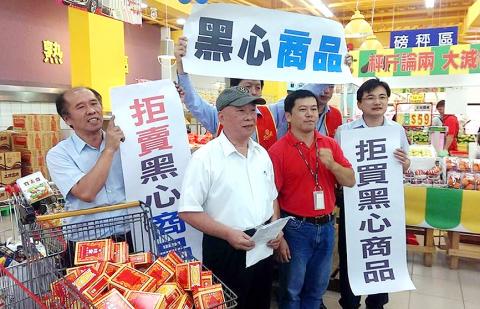Ting Hsin International Group’s (頂新集團) involvement in three food scandals in less than one year has prompted calls from netizens and civic groups for a boycott by consumers on the purchase of all goods and services offered by the company.
Cheng I Food Co (正義股份), a subsidiary of Ting Hsin, was this week found to be selling some lard-based oils for human consumption that had been mixed with low-quality oil meant for animal feed.
Last month, Wei Chuan Foods Corp (味全食品工業), also a subsidiary of Ting Hsin, recalled 12 products that had been made with recycled kitchen waste and industrial grease.

Photo: CNA
In November, the group apologized for the use of oils marketed as pure which had been mixed with lower quality oils by a supplier.
Netizens yesterday listed all the products and services under the purview of Ting Hsin and called for the general public to refrain from using these products and services.
Meanwhile, the Taipei City Government announced late yesterday that all of the city’s public schools and their on-campus stores, as well as social education institutions, would stop selling food products made by Ting Hsin and Wei Chuan Food Corp (味全) on Monday.
The Greater Kaohsiung Government yesterday also directed all the city’s public schools to pull Ting Hsin products from the shelves, adding that the local government’s agencies would also stop using Ting Hsin products.
Yilan County Commissioner Lin Tsung-hsien (林聰賢) was the first to introduce such a measure by announcing on Thursday that the county government’s agencies and schools would no longer buy products from Ting Hsin.
Lin, a Democratic Progressive Party (DPP) member, said access to healthy food was a basic human right and that the spate of food safety scandals in recent years has caused people to lose faith in the nation’s food industry.
He called for the nation’s food distributors and restaurants “not to sell or use” Ting Hsin products and for residents “not to buy, use or eat” anything made by the group or its subsidiaries.
Taiwanese singer Chang Chen-yue (張震嶽) yesterday criticized company bosses for the slew of food safety scandals and said they “were slowly murdering Taiwanese people.”
Director Chen Yu-hsun (陳玉勳) said in a Facebook post that voluntary workers had been tainted by remarks by Wei Ying-chun (魏應充) that he would become a voluntary worker after stepping down as chairman of Ting Hsin Oil, Cheng I and Wei Chuan Foods Corp.
Chen asked if volunteer work is the most contemptible job in the world, adding that Wei’s considerable personal wealth should be confiscated to help fund the National Health Insurance program.
It was bad enough that rich people were continuing to make money unethically, but it is worse that government officials actively cover for them, he added.
Additional reporting by Stacy Hsu and CNA

The manufacture of the remaining 28 M1A2T Abrams tanks Taiwan purchased from the US has recently been completed, and they are expected to be delivered within the next one to two months, a source said yesterday. The Ministry of National Defense is arranging cargo ships to transport the tanks to Taiwan as soon as possible, said the source, who is familiar with the matter. The estimated arrival time ranges from late this month to early next month, the source said. The 28 Abrams tanks make up the third and final batch of a total of 108 tanks, valued at about NT$40.5 billion

Two Taiwanese prosecutors were questioned by Chinese security personnel at their hotel during a trip to China’s Henan Province this month, the Mainland Affairs Council (MAC) said yesterday. The officers had personal information on the prosecutors, including “when they were assigned to their posts, their work locations and job titles,” MAC Deputy Minister and spokesman Liang Wen-chieh (梁文傑) said. On top of asking about their agencies and positions, the officers also questioned the prosecutors about the Cross-Strait Joint Crime-Fighting and Judicial Mutual Assistance Agreement, a pact that serves as the framework for Taiwan-China cooperation on combating crime and providing judicial assistance, Liang

A group from the Taiwanese Designers in Australia association yesterday represented Taiwan at the Midsumma Pride March in Melbourne. The march, held in the St. Kilda suburb, is the city’s largest LGBTQIA+ parade and the flagship event of the annual Midsumma Festival. It attracted more than 45,000 spectators who supported the 400 groups and 10,000 marchers that participated this year, the association said. Taiwanese Designers said they organized a team to march for Taiwan this year, joining politicians, government agencies, professionals and community organizations in showing support for LGBTQIA+ people and diverse communities. As the first country in Asia to legalize same-sex

MOTIVES QUESTIONED The PLA considers Xi’s policies toward Taiwan to be driven by personal considerations rather than military assessment, the Epoch Times reports Chinese President Xi Jinping’s (習近平) latest purge of the Chinese People’s Liberation Army (PLA) leadership might have been prompted by the military’s opposition to plans of invading Taiwan, the Epoch Times said. The Chinese military opposes waging war against Taiwan by a large consensus, putting it at odds with Xi’s vision, the Falun Gong-affiliated daily said in a report on Thursday, citing anonymous sources with insight into the PLA’s inner workings. The opposition is not the opinion of a few generals, but a widely shared view among the PLA cadre, the Epoch Times cited them as saying. “Chinese forces know full well that